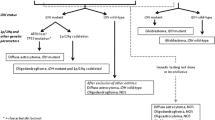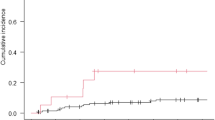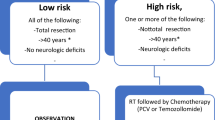Abstract
Background and aims
Current standard treatment for metastatic medulloblastoma consists of 36 Gray (Gy) of craniospinal irradiation (CSI) supplemented with local irradiation and adjuvant chemotherapy after surgery. Although contemporary protocols have been designed to limit a radiation dose using risk-adapted CSI dosing to reduce neurocognitive morbidity, high-dose CSI remains the standard of care. Recently, the molecular classification of medulloblastoma has been emerging but its clinical significance has not been established particularly in patients with metastatic medulloblastoma treated with lower dose of CSI.
Methods
We molecularly analyzed three cases of metastatic medulloblastoma treated with 24.0 Gy of CSI by DNA methylation analysis using the Illumina EPIC array.
Results
All three patients had spinal metastases at the time of diagnosis. Postoperative treatment included multiple courses of chemotherapy, 24 Gy of CSI with focal boost to primary and metastatic sites, and high-dose chemotherapy. There was no disease progression observed during the 9.0, 7.7, and 5.7 years post-diagnosis follow-up. The molecular diagnosis was Group 3/4 in all three cases. Cases 1 and 2 belonged to Subtypes 7 and 4, both of which were reported to be good prognostic subtypes among the group. Case 3 belonged to Subtype 5 with MYC amplification.
Conclusions
The present cases suggest that the novel subtype classification in Group 3/4 medulloblastoma may be useful for risk stratification of patients with metastatic medulloblastoma who received lower dose of CSI than standard treatment.

Similar content being viewed by others

Data availability
The data that support the findings of this study are available on request from the corresponding author.
References
Coltin H, Pequeno P, Liu N et al (2023) The burden of surviving childhood medulloblastoma: a population-based, matched cohort study in Ontario, Canada. J Clin Oncol JCO2202466
Ramaswamy V, Remke M, Bouffet E et al (2016) Risk stratification of childhood medulloblastoma in the molecular era: the current consensus. Acta Neuropathol 131(6):821–831
Yamasaki K, Okada K, Soejima T, Sakamoto H, Hara J (2020) Strategy to minimize radiation burden in infants and high-risk medulloblastoma using intrathecal methotrexate and high-dose chemotherapy: a prospective registry study in Japan. Pediatr Blood Cancer 67(1):e28012
Capper D, Jones DTW, Sill M et al (2018) DNA methylation-based classification of central nervous system tumours. Nature 555(7697):469–474
Sharma T, Schwalbe EC, Williamson D et al (2019) Second-generation molecular subgrouping of medulloblastoma: an international meta-analysis of Group 3 and Group 4 subtypes. Acta Neuropathol 138(2):309–326
Michalski JM, Janss AJ, Vezina LG et al (2021) Children’s oncology group phase III trial of reduced-dose and reduced-volume radiotherapy with chemotherapy for newly diagnosed average-risk medulloblastoma. J Clin Oncol Jco2002730
Japan Registry of Clinical Trials. https://jrct.niph.go.jp/en-latest-detail/jRCTs051200021. Accessed 3 Feb 2023
Funding
This study was funded by Kawano Masanori Memorial Public Interest Incorporated Foundation for Promotion of Pediatrics, Gold Ribbons Network of Japan, and a grant from Saitama Children’s Medical Center (2019-B4), Children’s Cancer Association of Japan.
Author information
Authors and Affiliations
Contributions
Draft: T.I. Revision: K.F, Y.T, A.N, K.I, J.K, K.K
Corresponding author
Ethics declarations
Conflict of interest
The authors have no conflicts of interest to disclose.
Additional information
Publisher’s Note
Springer Nature remains neutral with regard to jurisdictional claims in published maps and institutional affiliations.
Rights and permissions
Springer Nature or its licensor (e.g. a society or other partner) holds exclusive rights to this article under a publishing agreement with the author(s) or other rightsholder(s); author self-archiving of the accepted manuscript version of this article is solely governed by the terms of such publishing agreement and applicable law.
About this article
Cite this article
Irikura, T., Fukuoka, K., Nakazawa, A. et al. Molecular characterization of long-term survivors of metastatic medulloblastoma treated with reduced-dose craniospinal irradiation. Childs Nerv Syst 39, 2505–2507 (2023). https://doi.org/10.1007/s00381-023-05971-8
Received:
Accepted:
Published:
Issue Date:
DOI: https://doi.org/10.1007/s00381-023-05971-8



